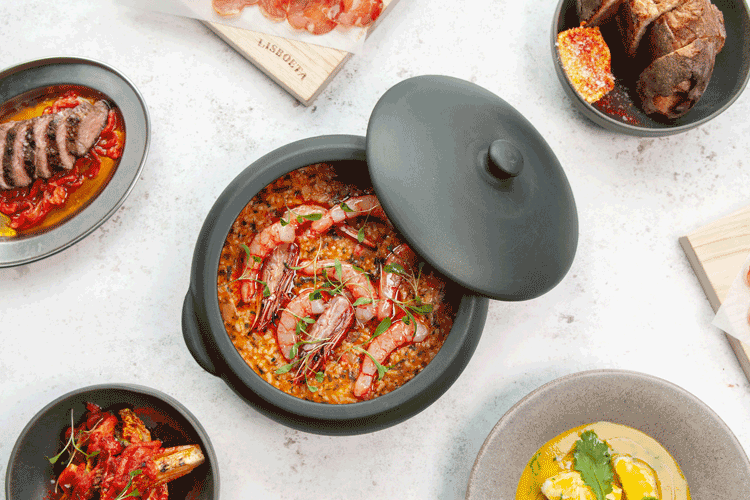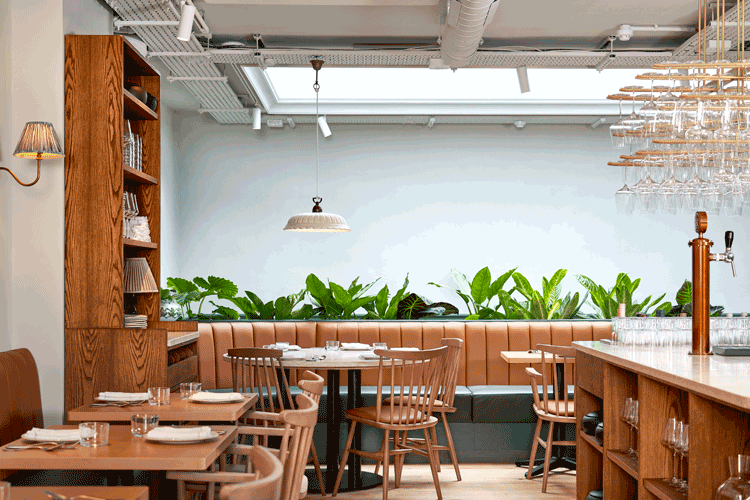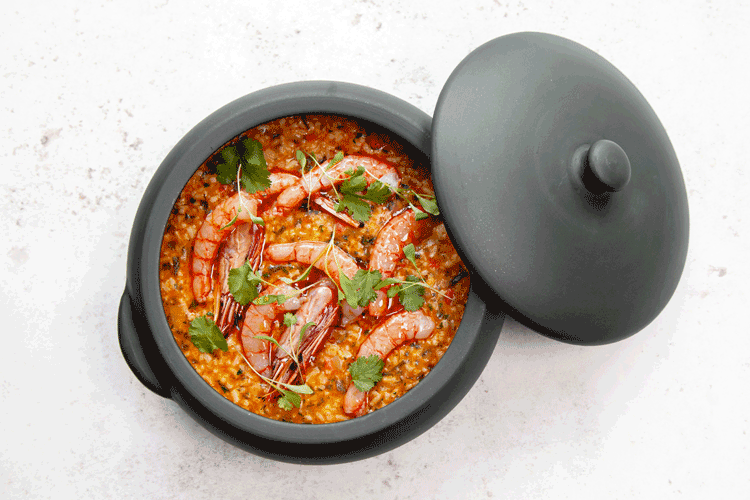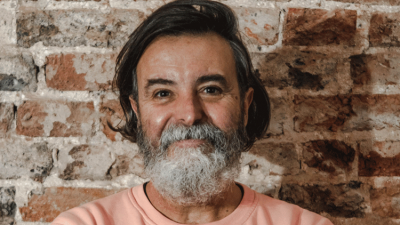Nuno Mendes: “I want to keep dreaming”

Nuno Mendes is in a reflective mood when we meet on his home turf of Broadway Market in east London. We get a filter coffee from Climpson & Sons and before the formalities he takes me on a stroll around the neighbourhood, pointing out his favourite cafés, bakeries and shops.
When we do eventually sit down to chat about Lisboeta, his new Portuguese restaurant opening on Charlotte Street, it’s on a park bench in London Fields. Close by a personal trainer is shouting orders (or is it encouragement?) to one his clients as they do pull ups on the outside gym equipment, and Mendes cheerily calls out to him. On another day it would be the 49-year-old chef undertaking a very public gym session, he tells me, and while I can’t picture Mendes, with full, whitening beard and dressed in a heavy overcoat, doing squat thrusts in gym shorts in full public view, I keep it to myself.
This might be the first interview I’ve conducted on a park bench but it’s not my first with Mendes, a chef whom I’ve followed closely and admired since the days of his Loft Project, where he invited fellow chefs and guests into his home to cook and eat family style (his ‘fine dining in trainers’ gastropub Bacchus in Hoxton being before my time). Since then, he has gone on to open Viajante at Bethnal Town Hall in 2010, which won a Michelin star, and Maos in Shoreditch in 2018, which also won a star, as well as oversee the hugely successful launch of Chiltern Firehouse in 2013, where he was executive chef until recently, and open Portuguese restaurant Taberna do Mercado in Old Spitalfields Market in 2015.
Of these projects only Chiltern Firehouse, owned by hotelier André Balazs, remains, yet anyone who knows the softly-spoken, engaging chef knows he is not one to sit still. Most recently his work has taken him back to his home city of Lisbon where he is creative chef at the Bairro Alto Hotel overseeing the food at a number of restaurants, and it is the food of Lisbon that he is now bringing to London.
A ‘return’ to London
With more than a two-year hiatus since his last permanent London project, Lisboeta is a return of sorts to the capital for Mendes. While his work has taken him to Portugal Mendes has remained a Londoner, and more specifically an east Londoner, throughout this period.
“I have read lots of articles saying ‘Nuno is coming back to London’,” he says. “I’ve been in London the whole time, but yes I have not done a project here for a while.”
The return to Lisbon for work is not surprising. A few years earlier Mendes penned a cookbook called Lisboeta, celebrating the food of where he grew up. “Lisboeta gave me a chance to go back to Lisbon on a regular basis and I really love that. I told myself I wanted to do more things in Lisbon and Portugal, so I’ve shifted my attention to there.”
More recently, changes in his circumstances and career have enabled him to spend more time there. In May 2021 he parted company “amicably” with Chiltern Firehouse after eight years there. “My contract was up for renewal, and I didn’t see what else I could add to the project,” he explains. “The pandemic has forced businesses to shift into a different format and I didn’t feel like my help was needed. My role was more creative director for food, and it was obsolete in a sense, I was not adding anything.”
It was during his time spent in Portugal that Mendes struck up a friendship with MJMK founders Marco Mendes and Jake Kasumov, which would later turn into the partnership behind Lisboeta the restaurant. Marco, who is half Portuguese, was the brainchild behind him and Kasumov launching peri peri chicken restaurant Casa do Frango in London and the pair had later sought Mendes’ advice on the concept. As it turned out, there were other synergies between Mendes and MJMK: Ben Morgan, head chef at Santiago Lastra’s Mexican restaurant Kol, which is also part of the MJMK group, was a chef de partie at Viajante and Mendes also says he spent some time with the Kol team when the restaurant was coming out of lockdown.
“We started talking. Marco and Jake said they loved my book and would love to do something with me the way they have with Santiago. They wanted to create a partnership and back me to open my restaurant, but it was nice because it started with a mutual respect and friendship.”
Opening in Fitzrovia, with Lisboeta Mendes finds himself in new territory. With the exception of Chiltern Firehouse, all his projects have been local – or fairly local in the case of Taberna do Mercado - to where he lives in east London, an area where he is obviously most comfortable. What was the motivation behind going more central?
“It’s the right place to launch a concept like this,” he says after a pause to sip his coffee. “I really like Charlotte Street. When it comes to a central London location it is my favourite street. And it’s accessible. A lot of my guests complain about having to come to Bethnal Green so they will be happy to not spend two hours getting to it.”
A love letter to Portugal
So, to Lisboeta, described as Mendes’ ‘love letter to Portugal’. Set over three floors of a town house, the restaurant has an evolving menu devised by Mendes and head chef Rodrigo Alves designed to reflect Lisbon’s dining culture.
The menu kicks off with a selection of snacks such as a Goan-spiced pork pie; and morcela sausage and razor clams on toast, as well as charcuterie and cheese. These are followed by small plates such as grilled asparagus with a wild garlic sauce; deep-sea scarlet prawns with garlic and piri-piri; and grilled acorn-fed black pork with fermented red pepper paste.
Also available at large ‘pots and platters’ for the table, such as carabineiro prawn and razor clam rice; and chanfana lamb shoulder and red wine stew and a ‘direct from Portugal’ section that has a focus on the sea and will comprise giant red prawns goose barnacles, the latter when it is possible to source them.
In the future, from 3.30pm to 5pm Lisboeta will serve a dedicated afternoon snack menu of both sweet and savoury dishes, most notably a take on the traditional custard tart, pastel de nata do reino, and a bifana (acorn-fed black pork sandwich).
Design wise, the restaurant’s interiors are unmistakably Portuguese, featuring a combination of whitewashed walls and exposed brick. Running the length of the ground floor is a counter-style bar backed with built-in wooden cabinets in the style of a traditional Portuguese pharmacy, while a sweeping wooden staircase leads to upstairs dining room with floor-to-ceiling windows.
At 100 plus covers it’s a larger project than many of Mendes’ previous ones, although his time at Chiltern Firehouse means he in unfazed by such scale. But he isn’t fully turning his back on the more intimate style of hospitality that he nurtured at The Loft Project and spearheaded at his time at Maos - which had a single 16-seat communal table when he was there - with the lower ground floor of the restaurant home to the ‘adega’, a wine cellar that will host a more intimate and heightened gastronomic experience.
An accessible restaurant
Lisboeta pairs some of the intimacy of Mendes’ higher-reaching projects with the larger scale of Chiltern Firehouse and the more casual vibe of Taberna do Mercado. Was this a conscious decision or just a natural evolution based on where Mendes is in his career?
“I wanted to do something meaningful, hopefully,” he responds, momentarily side-tracked as an old friend he hasn’t seen for a while cycles past. “I didn’t want to do fine dining but open a restaurant that is accessible. Yes, we can take you for a ride and go crazy, give you some amazing wines if you want to blow out, but you can also eat at the counter and have a nice meal or a piece of tart and a glass of wine or coffee.
"I don’t like the idea of elitism.
Good food should be available to as
many people as possible”
Mendes’ aim is for Lisboeta to be a destination restaurant but also a neighbourhood one, depending on how customers choose to use it. “I don’t want to be defined by a Michelin star. I don’t want to be defined by Chiltern Firehouse or any of the projects I’ve done. The love that I have for the Firehouse, or the Loft Project, or Taberna or even Bacchus is still there but it was so fucking crazy and so exiting and simple back then. All you had to do was wake up, make nice food and have fun – now there is so much more to it.”
He says he is thrilled for his friends at The Clove Club for winning its second star. “They fucking worked so hard for that. Sometimes I think if Viajante was still around where would it be? But then if I’d just kept on that journey only, I think I would have been missing such a big part of myself.”
Does his miss Viajante? “I do. Tremendously in some ways, but I never wanted it to be the whole of me. One thing I’m proud of is that I also opened Corner Room (a more informal space within Bethnal Green Town Hall). Corner Room was a necessary part of Viajante. We were doing a fine dining tasting menu in an area that 10 years ago was much poorer than it is now; a lot of people living there couldn’t afford to eat at Viajante and I wanted friends of mine and people who lived there to have an option. You could spend £25 and have a great time – it was accessible.
“I’m not sure if it’s a social responsibility but for me I feel like if I’m going to propose that kind of experience, I need something of the polar opposite. I don’t like the idea of elitism – good food should be available to as many people as possible.”
The traveller
When Viajante opened in Bethnal Green much was made of the name, translating as traveller, which referred to the Portuguese chef’s nomadic career. Born in Lisbon he studied at the California Culinary Academy in San Francisco and later went to Japan to further hone his cooking technique. He then spent a number of years travelling the world, soaking up experience from culinary luminaries such as Jean-Georges Vongerichten, Wolfgang Puck and Ferran Adrià and living in places such as New Mexico and New York.
Since then, he has gone on another journey in London in a career with many highs but also a number of lows, which include leaving Maos two years after helping launch it and just four months after it won a star. More recently he wrote an impassioned Instagram post revealing how he had been involved in opening a Portuguese restaurant in London only to discover the partnership wasn’t as it was described only days before it opened.
Unsurprisingly he won't be drawn on the specifics, but they have clearly left their mark. “I’ve had the empty promises, the 50% of nothing equity stakes, the working to the bone giving it all and getting shafted and all that shit. I try not to be a bitter person. Some things are not meant to be but there are a lot of sharks out there. It takes a long time to find people you can really trust.”
Lofty visions
You’d think that Mendes’ bad experience with potential partners would have moulded him into the chef and restaurateur he is today, but his desire to create a strong bond between chef and backer pre-dates many of his own experiences. Back in 2009 when he started the Loft Project the idea was to not only throw a light on and nurture new talent but help create long-lasting and ultimately fruitful industry relationships.
In a sector where chef collaborations are now commonplace it’s easy to underestimate how revolutionary The Loft Project was at the time, or how much good came of it. Mendes embodied - and to this day still does - a feeling of cooperation, of collaboration and solidarity between emerging chefs that hitherto hadn’t really existed.
“The premise of The Loft Project was to be able to give people a chance to showcase their work and hopefully find people who will back their dreams,” he explains. “For so long backer and chef have been so dis-aligned.”
A sequence of events led to Mendes inviting people into his home. Having lived in Lower East Side in Manhattan Mendes fell in love with the similar energy and space of east London and thought there was an opportunity to try and replicate the neighbourhood restaurant feel of New York over here.
"It takes a lot of fucking balls to say it’s
just not working and try and muster
up the energy to try something else"
“At the time there was very little here [in terms of restaurants]. I fell in love with cooking in a neighbourhood with people I could relate to. I wanted to break through the boundaries and question what the essence of a restaurant is. If we can bridge that gap and take out all the technical stuff and distil it to the contact between the chef and the guest and bring it into a home environment, we can recreate the idea of a family dinner with people who connect with each other.”
There was more to the project than this familial approach, however. By working with up-and-coming chefs before they had a restaurant of their own, Mendes attempted to catch them at a crucial juncture of their cooking journey. “I wanted to capture these young chefs at a time when they are not yet withered down by this industry, when they are still idealistic and alive inside. To give them a platform to showcase their work and flourish.
“I had a record label when I was 19 and one of the most inspiring moments in music is when a young band gets on stage and you see that their energy, drive and passion is so strong. It’s so electrifying and captivating and when you catch their first breath it’s the best time you’ll see them. Then they get more technical, play bigger venues, have managers and record labels and it becomes more commercial and loses that intimacy. The Loft Project was my way of creating that expression in food.”
A drive to succeed
Lisboeta is indeed a new chapter for Mendes, a chef who has had more success but also hit more bumps in the road than many of his contemporaries. The love and respect that he still garners from his peers is testament to how people regard his contribution to cooking in the capital. His CV also shows a man for whom lying down is not an option.
“I want to keep dreaming,” he says when I ask if he ever considered never doing another London project. “It’s important to have something in London that shines a light on Portugal. I feel like I should explore those different sides of myself and what I want to do. It takes a lot of fucking balls to say it’s just not working and try and muster up the energy to try something else. There is collateral damage for you and the people involved but I feel like I have not fucked over a lot of people in my life.”
"The pride of a Portuguese person
to be able to champion the food
of my country and city is huge"
From every project there have been learnings. With Taberna do Mercado, his casual, small plate Portuguese restaurant that opened in Spitalfields in 2015 but closed three years later, he says the location was wrong. “We couldn’t compete with the lunch trade. A lot of places selling lunch for £6, and we could not compete with that with what we were trying to do there. The transient nature of people there also meant there was no real community.”
On a more positive note, Mendes says many of his loyal customers had a strong connection with the restaurant. This made him believe that, in the right location, his ambition to cook Portuguese food in the capital could be revived. “Sometimes you have the right concept but the wrong location. Do you take it as a complete failure or that it didn’t have the right chance?”
London or Lisbon?
With MJMK as partners, and the company’s track history of creating brilliant restaurants, the right chance has come, and all the signs point to Lisboeta being a success. And then what? With his work commitments in Lisbon as well as London, will the traveller eventually cut his ties with east London and finally return home?
“One day I’d like to do something here [east London] but at the same time do I just cash my chips and focus my energy on Portugal and keep most of my stuff there and Lisboeta here? I’ve been very transparent and when things are settled, I’d like to be based in Lisbon and travel here rather than be based in London and travel to Lisbon. I’m not going to lose touch with the project but to put it into perspective, until this point I’ve basically been working five days in Portugal and spending the weekends here.”
Now a single father of three children, Portugal has other attractions, not least the weather and a lower cost of living. “I’ve lived in a lot of places around the world but I fucking love this city. I love this part of London especially. But it’s hard because realistically I will never be able to afford to buy a house here and that makes me sad.
“If I can live in a place where the sun always shines and be by the beach, then why not? What kind of life do I want for myself and my kids? Where do I want to wake up in the morning? I feel like my children could have a good quality of life [in Portugal].”
For now, Londoners should be grateful that Mendes is laying down fresh roots with Lisboeta and is keen to have a second crack at bringing his beloved cuisine to the people.
“I want to leave something here,” he says, taking in the view of London Fields from his bench perch. “London has been so good to me. The pride of a Portuguese person to be able to champion the food of my country and city is huge and I can’t give up on that. It deserved a second chance. Let’s see where it goes.”




































